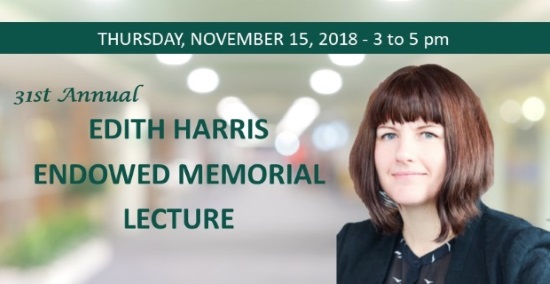Social Work's hosts Edith Harris lecture on mass incarceration to highlight new Center for Behavioral Health and Justice

Mass incarceration does not control crime or improve public safety, so why does it make us feel better?
That is the question clinical social worker Elizabeth Kita will attempt to answer when she delivers the Wayne State School of Social Work's 31st Annual Edith Harris Endowed Memorial Lecture on Thursday, Nov. 15 from 3 to 5 p.m. at the Community Arts Auditorium. The talk has been planned to highlight the school's opening of a new Center for Behavioral Health and Justice focused on "smart decarceration," or the diversion of individuals away from the criminal justice system to mental health and substance abuse treatment where appropriate.
Titled "They hate me now but where was everyone when I needed them?": Trauma, mass incarceration, and social work praxis through a psychoanalytic lens," Kita's talk concludes that mass incarceration - a uniquely American institution - serves an important psychological function for society, related to our anxieties around race and inequality, which is part of why we continue to invest in it despite its failure. Focusing on the relationship between oppression, violence, trauma and incarceration, Kita will examine how the criminalization, imprisonment and disenfranchisement of millions of people in the United States - most of whom are people of color and people who are poor - has relegated social problems such as trauma, violence, addiction, and mental illness to a system that perpetuates rather than addresses them.
The San Francisco-based Kita, who earned an M.S.W. from the University of California, Berkeley and a Ph.D. in social work from Smith College, has practiced with incarcerated and formerly incarcerated people for more than 15 years. Currently, she practices in a public clinic with people who have returned to the community after serving life sentences and has a private practice working with people who are suffering from complex PTSD, secondary traumatic stress, and vicarious traumatization. She also provides consultation and supervision, teaches in the M.S.W. program at Berkeley, and chairs the Coalition for Clinical Social Work.
During her lecture, Kita will describe how the integration of psychoanalytic and sociological theories can inform clinical praxis to advance social justice. Her position is supported by the research housed within the School of Social Work's Center for Behavioral Health and Justice. The new 'center of excellence' is helping to inform practice and policy development across Michigan and beyond. Specifically, the center focuses on statewide jail diversion, assistance to counties working to keep individuals with mental illness out of jail, and wraparound supports to individuals exiting prison who have co-occurring mental health and opioid use disorders.
The center will also serve to enhance educational and volunteer opportunities for Wayne State social work students and interested community members. The Center will be feted with an open house on Nov. 1 from 3:30 to 5:00 p.m. at the McGregor Conference Center.
The Edith Harris lecture is free and open to the public and has been approved by the MI Social Work Continuing Education Collaborative for two CE contract hours at a cost of $10 under CE Approval #: MICEC-0058. No pre-registration is required. For additional information on this event contact Betsy Vanderstelt (fq0994@wayne.edu or 313-577-4464) or visit the Wayne State University Event Calendar.